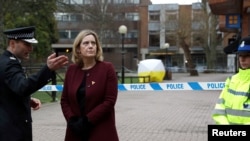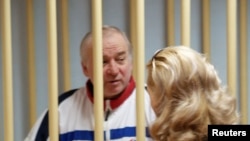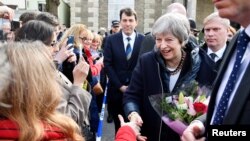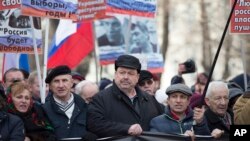“I brought tea for you — English tea, from Fortnum and Mason, the very best,” chirped the financial adviser in the foyer of a plush Moscow hotel near the Kremlin. “You have a package for me, I think,” he added before scurrying off with his Russian client.
The adviser, like many of his British colleagues, has been making routine rounds to reassure clients since the poisoning of former Russian double agent Sergei Skripal in Britain, an attempted assassination Britain accuses the Kremlin of orchestrating.
British ministers and their Kremlin counterparts have been threatening further reprisals after retaliatory expulsions of diplomats in response to the Skripal attack.
With Anglo-Russian relations plunging to their lowest point since the Cold War, British financial advisers in Moscow had expected to encounter Russian clients anxious about Britain mounting a retaliatory financial crackdown on Russian money invested in London.
British Prime Minister Theresa May has promised to go after the financial assets in Britain of wealthy Russians connected to the Kremlin.
But it is business as usual in Moscow.
Advisers visiting the Russian capital say oligarchs and other super-wealthy businessmen appear unconcerned, having concluded May is all bark and no bite.
Part of the reason is Britain has been reluctant in the past to use existing legislation to probe too deeply into the origins of Russian money spent in Britain, fearing it might lead to an exodus of Russian cash from the country. Moscow investors also believe Brexit-mired Britain is going to need Russian money even more in the future and chasing it out risks frightening super-wealthy investors from other countries.
“My clients don’t see it as a threat,” said the adviser who exchanged tea for a package of signed documents. He asked not to be identified. “Neither do we. The new measures being drafted are just repeating legislation that’s already available and will rest largely unused. What few investigations launched will take forever and then get bogged down in the courts,” he said.
Britain’s past unwillingness to investigate Russian money, and the suspicion Britain isn’t serious this time either, is not helping May persuade Britain’s European allies to do more than issue statements of solidarity over the Skripal poisoning.
Norbert Röttgen, chairman of Germany’s parliamentary foreign affairs committee, has highlighted the need for Britain “to examine its open stance toward Russian capital of dubious origin” before it starts asking for concrete action by Britain’s allies.
In response to doubts about their determination, British officials say they are likely to ban secretive Scottish limited partnerships that have been used to hide the true ownership of some Russian-origin money. The Scottish-based shell companies have long been a target of transparency campaigners.
May briefed EU leaders Thursday in Brussels on the investigation into the March 4 nerve-agent poisoning of Skripal and his daughter Yulia in Salisbury. Both remain in serious condition and are under heavy sedation.
May warned her fellow EU leaders that Western democracy is under threat from Russia.
“The challenge of Russia is one that will endure for years to come,” she told them according to extracts released in advance by her office. “As a European democracy, the United Kingdom will stand shoulder to shoulder with the European Union and with NATO to face these threats together. United we will succeed.”
EU leaders strongly condemned the attack agreed it “highly likely” that Russia was responsible for the Salisbury nerve-agent attack. Following a working dinner at a Brussels summit, European Council President Donald Tusk revealed the bloc’s member states backed the British government’s assessment there is “no other plausible explanation” than Moscow’s culpability. The EU has instructed its ambassador to Moscow to return to Brussels for consultation.
Fearful of pushback, the British government hasn’t asked EU partners to agree to fresh sanctions on Russia in addition to the Ukraine-related ones already in effect. But British officials have urged European neighbors to expel undeclared spies among Russian diplomats based in their countries and at least five countries — France, Poland and the three Baltic states — say they could now follow Britain’s lead by expelling suspected Russian spies.
Several states, including Italy and Greece, appear eager to shield their ties with Russia and wanted to water down the assessment that Russia is highly likely to have been behind the attack. Officials from Greece and Italy worry the British accusation has not yet been proven.
They are not alone, even some Putin critics in Russia question whether the Kremlin ordered the attack.
Outspoken Putin opponent Gennady Gudkov, a former KGB counter-intelligence officer, says he believes Russian intelligence has carried out overseas assassinations in recent years, but he says he “can’t find rational explanations for” the attack on Skripal.
“After the so called umbrella assassination’ of Georgi Markov in London in the late 1970s, the KGB decided to stop all special [assassination] operations abroad.It seems to me that today the concept has changed and some of the special operations related to the elimination of political opponents has been done with the help of the intelligence,” he told VOA.







